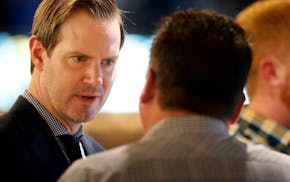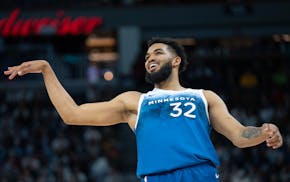Bob Shelton will turn 86 on July 25. He figures to have totaled 85 or lower for 18 holes at Hiawatha Golf Club a few times in the seven weeks before gaining that extra stroke in the relentless battle of golfer vs. age.
Shelton is black and grew up in New Orleans during decades of virulent segregation. He was in the military in the 1950s. He worked as a caddie before and after that, mostly at New Orleans Country Club and Metairie Country Club.
Freddie Haas Sr. was hired as Metairie's head pro in 1938. The senior Haas taught the fundamentals of the game to Shelton as a young caddie, with this twist:
"Fred Sr. didn't know he was teaching me the game," Shelton said. "He didn't want to be teaching me. I learned by caddying for him and studying him. He had a sweet flow to his swing."
So when Bob went to a public course on a day off, he would try to emulate that flowing swing?
Shelton smiled slightly and said: "We didn't play golf. The public courses were also off-limits. They didn't want us playing golf."
That attitude did not completely deter Shelton and his friends.
"Way back before steel, the shafts on golf clubs were oak," Shelton said. "When one of those fellows at the country club would snap a shaft, either on a swing or from throwing it, we'd slip it in the bag and take it home.
"Then someone would climb up in a tree, cut off a new branch that was whippy, and we'd carve it and sand it, and we'd have a club. We'd find some open land, make a few small holes, and that was our golf course."
Freddie Haas Jr. received more formal teaching from his father. He was a nationally prominent amateur in the 1930s, and became a five-time winner on the PGA Tour.
"He was an outstanding player, but I'd say he was … experiment-us," Shelton said. "When something was working, he would be trying to find something that worked better."
Bob Shelton has been more of a stick-with-what-works player. And that club-throwing he saw at the country clubs?
"Never been tempted," Shelton said. "Anger does not help on the golf course."
Shelton moved to the Twin Cities in the early 1960s, following his brother James by two years. He seized on a federal program to become a teacher: two years in General College at the University of Minnesota, a bachelor's degree in education at Augsburg, and then a master's degree back at the university.
He taught for 35 years at Bethune Elementary in Minneapolis, which he found rewarding — plus having those 10-11 weeks off in the summer to play golf.
"I think the first real round of golf that I played was in the Bronze [Amateur] … maybe 1965," Shelton said.
This was a festive celebration of African-American golf, and life, in the Twin Cities. It was so big at one time that Joe Louis showed up to play (and won the open division) in 1957.
Big stage for a debut, Bob. How did you know you could play?
"I knew all the time that I could play," Shelton said. "I just had to find the time to start playing."
The Twin City Golf Club was started as an organization of African-American golfers by Jimmy Slemmons and Ted Allen in 1931. The Bronze Amateur started in 1939, shut down for four years during the Big War, and still goes on today — although in a considerably smaller form.
Shelton won the Golden Senior championship last summer. "I've won a few divisions, but never did win the big one at the Bronze," he said.
Bob was in the clubhouse at Hiawatha on Tuesday morning. There's a group of black players that have held the 10 a.m. to 11 a.m. tee times on Tuesdays at Hiawatha for 20 years.
The group is called ONGL — and goes back closer to a half-century, as indicated by the original name: Old Negro Golf League.
The founders included Earl Bowman, Bill McMoore, Ted Cook, Ed Solomon, Richard Green … important African-Americans in the Twin Cities, and all capable of agitation on the golf course.
Shelton isn't much for that. He was a scratch player for years and in his mid-80s carries a 9-handicap. No bragging for Bob; just golfing.
"We do the bragging for him," Butch Davis said. "We call him Sweet-Swingin' Shelton."
Shelton's partner Tuesday was John Henderson, the former Vikings receiver, and "Honey Hands" in the ONGL.
"Bob Shelton is amazing," Henderson said. "Down the middle, 225, 230, and that man can chip and putt."
Bob looks fit as can be. The only thing that might stop him from breaking his age at Hiawatha in the foreseeable future could be the Minneapolis Park Board giving in to other influences, closing the golf course, and turning Hiawatha fully into a glorified nature preserve.
The bureaucrats announced last August they would close the course. Then, lobbying from the ONGL and others helped forestall that at least to 2023.
Sixty years ago, Bob Shelton couldn't play a real golf course in New Orleans. Do we really want to take his favorite Minneapolis golf course away from him now?

Reusse: Success on court helped Timberwolves do strong business

Reusse: Taylor's story. 'I just bought the Minnesota Timberwolves.'

Reusse: Back from injury, Towns doesn't have to carry load


